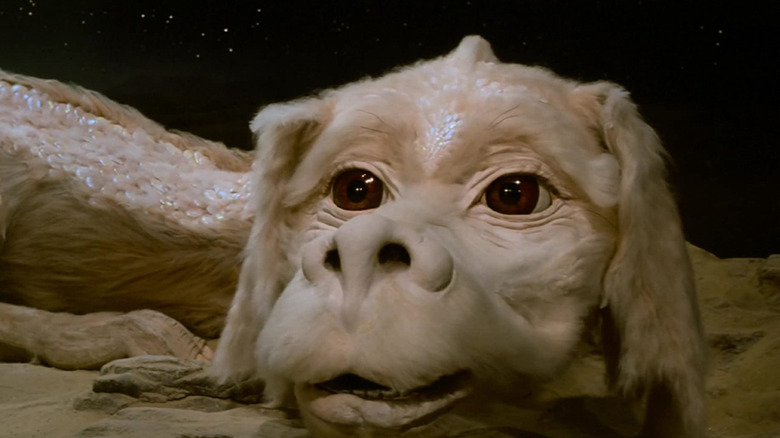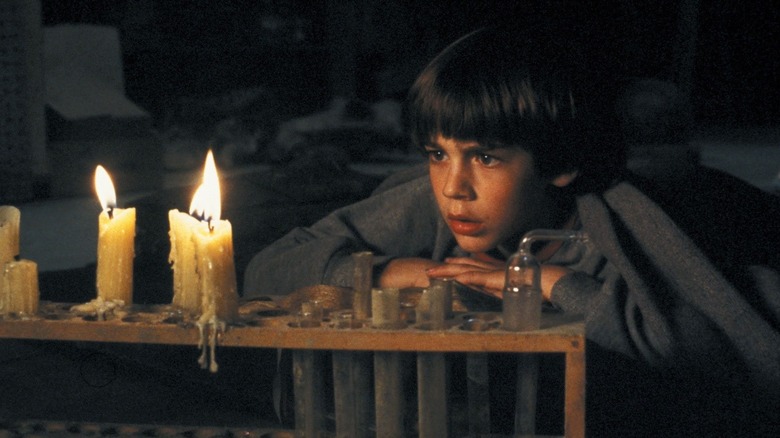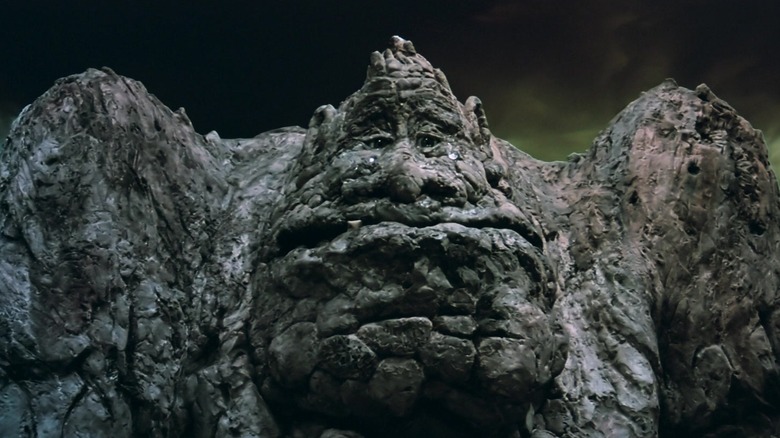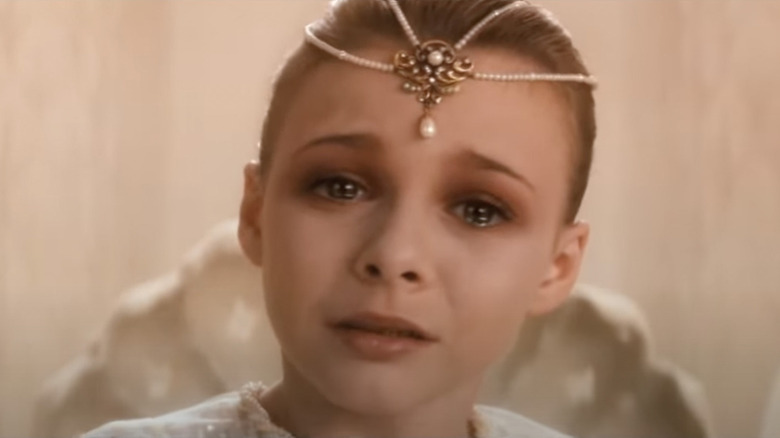Alan Oppenheimer Had No Trouble Finding Voices For The NeverEnding Story's Fantasy Creatures
Up until a few years ago, there was a shady little pub here in Brno, Czech Republic, that only had one desirable feature: A six-foot statue of the lovable Rockbiter creature from "The NeverEnding Story." I would even take people there to suffer bad beer just so we could marvel at that unexpected monument to Wolfgang Petersen's dark fantasy adventure. It wasn't the only legacy of the film's enduring popularity around here; Limahl's title song, which was a hit single across Europe, is still played on regular rotation on the local radio station. It is one of the many benefits of living in the Czech Republic.
"The NeverEnding Story," based on the first half of Michael Ende's epic fantasy novel, was Petersen's next project after spending three years making his tense U-boat drama, "Das Boot." The German director received an Oscar nomination for his troubles but wanted to make his next film something that would appeal more to his 10-year-old son. As luck would have it, he soon got a chance. His compatriot Helmut Dietl, originally on board to direct the film, was dropping out and the producer wanted to know if Petersen was interested. He jumped at the opportunity (via Entertainment Weekly).
Once the film was complete, Petersen needed someone to voice Falkor, the furry Luck Dragon who helps the film's young protagonist Atreyu (Noah Hathaway) on his quest. Alan Oppenheimer was invited to audition; if you're an '80s or 90s kid, there is a good chance you'll know his voice. In his long list of credits, he is perhaps best known for Skeletor and his evil cackle in "He-Man and the Masters of the Universe." But once the voice actor landed the gig, he found himself chipping in with far more than he originally bargained for.
So what happens in The NeverEnding Story again?
"The NeverEnding Story" opens on 10-year-old Bastian (Barret Oliver), an avid reader who is still trying to come to terms with the death of his mother. On the way to school one day, Bastian is chased by bullies. He gives them the slip by ducking into a dusty bookstore, where he becomes intrigued by the strange tome that the grumpy old owner is reading. The man tells him it isn't safe and not for him, which naturally piques his interest even further. When the proprietor goes to answer the phone, Bastian grabs the book and runs off to school.
Instead of going to class, Bastian settles down to read the book in the attic and finds himself immersed in the world of Fantasia and its inhabitants. We first meet Rockbiter, a towering stone creature, lamenting with his friends that the world is being destroyed by an all-consuming force known as "The Nothing." They head to the Ivory Tower to ask the Childlike Empress (Tami Stronach) for help, but find that the girl is dying, her grave illness linked to the existential threat devastating everything in its path. The only hope is Atreyu (Noah Hathaway), a young warrior who is sent to find a cure.
Atreyu is pursued on his journey by a terrifying wolf-like creature called Gmork, and that's not the only danger he faces on his way to the Southern Oracle to find out how to save the Empress. Along the way, he must also navigate the Swamps of Sadness and make it past two deadly sphinxes. Thankfully, he picks up with Falkor, a Luck Dragon, who flies him around places. The Oracle tells Atreyu he can save the Empress by giving her a new name, but can he make it back to the Ivory Tower in time?
Alan Oppenheimer voiced more than one creature in the film
When Alan Oppenheimer first met with Wolfgang Petersen to audition for "The NeverEnding Story," the director showed him an image of Falkor, the noble and friendly Luck Dragon who assists Atreyu on his quest. Listening to the scratch track (a temporary recording that would be replaced at a later date), Oppenheimer knew right away how the creature should be voiced and his interpretation got him the gig (via EW). He next flew to Munich, where the completed film was played for him while he added his vocal work to the dragon. He wasn't completely satisfied with his efforts and asked for a second take, which was when the "great heart and humanity" of Falkor emerged. Petersen remembered:
"[Alan] really brought to life the last and probably the most important character left, Falkor. He brought this rich, beautiful, and warm voice. The way he read those lines was truly unforgettable, just beautiful. That's why kids all over the world wanted to fly all over the world with a big, incredible creature like Falkor."
Petersen was so happy with the result that he asked Oppenheimer to take a look at another character, Rockbiter. The voice artist immediately identified with the big stone lunk and had no difficulty providing him with a voice, too. How about another? So Oppenheimer found himself uttering the sinister growls of Gmork, which led to yet another request: Would he also be the narrator? Oppenheimer was happy to oblige; "That day, Wolfgang got four voices for the price of one and I really loved it. I just really love that movie."
Does The NeverEnding Story still hold up?
"The NeverEnding Story" made decent box office internationally but it didn't perform nearly as well in the United States, even with Steven Spielberg working his magic and trimming seven minutes of footage to make it play better for American audiences. Petersen later suggested that this was down to it being "too European." According to Christine Hasse's "When Heimat Meets Hollywood: German Filmmakers and America 1985 – 2005," this meant:
"Its basic idea [was] too firmly rooted in the philosophical tenets of German Idealism to become a real hit with American audiences."
Now I'm not American and I don't know much about German Idealism, but even as a kid "The NeverEnding Story" stood out as something far more melancholy and doom-laden than many of the other cinematic fantasy adventures around at the time. Even a movie like "The Dark Crystal" was light-hearted by comparison, the scariness of the vile Skeksis and lumbering bug-like Garthim offset by the muppety nature of some of the other characters. There certainly wasn't anything as terrifying as the existential threat of "The Nothing," or as deeply traumatizing as the scene when Atreyu's horse gives up the will to live and dies in a swamp.
The gloom of the story seeps into every aspect of the film's cinematography and production design; even most of the friendly characters look pretty grim. Which makes me wonder, why is such a harrowing tale so widely beloved even today? Part of may be that it treats kids with respect, trusting them with heavy themes that even many adults might prefer not to deal with on family movie nights. Another aspect is the vocal performances of Alan Oppenheimer who, especially as Falkor, finds a note of warmth and hope amid all the murk.



